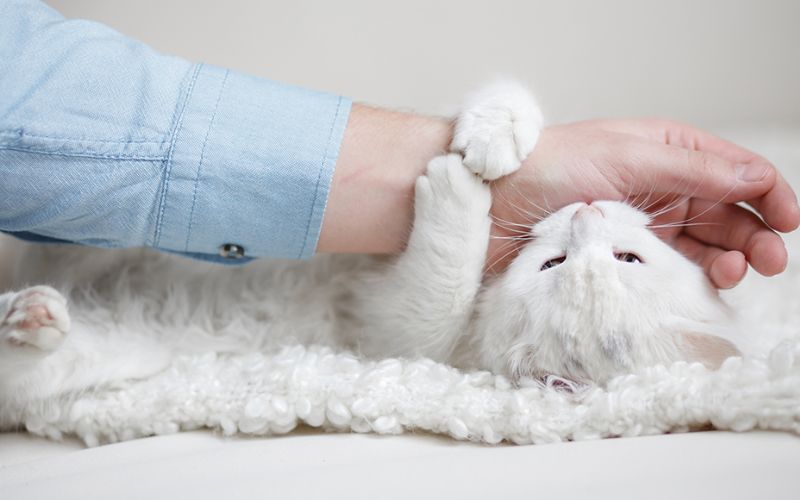Cats are fascinating animals because of their mysterious and free-spirited nature. They show affection frequently, yet sometimes they do things that seem violent, like grasp our hands and bite. The purpose of this essay is to explain the numerous causes of this behavior in your furry friend. You may strengthen your relationship with your cat and maintain peace in your home by learning more about its thoughts and feelings underlying its acts.
Why Does My Cat Grab My Hand and Bite Me?
Causes of Cats’ Aggression Towards Humans
Fun and Games
Cats are born hunters, and they often spend fun acting out hunting scenarios. Cats engage in interactive play when they grip and bite at your hand. They can mistake your hand for food and chase it around the yard. Even when they’re having a good time, you or someone else could get scratched or bitten if their nails aren’t cut.
Excessive stimulation
Excessive petting or grooming might be overwhelming for a cat because they have a threshold for stimulus. When they’ve had enough, they could bite to let you know they want some space. Watch for signs of discomfort, like as a twitching tail, flattened ears, or increased tension, and ease up on the caressing if necessary.
Seeking Public Notice
If you try to pet a cat, it may try to seize your hand and bite. They may resort to this method of communication if they are feeling ignored or need attention. To reduce attention-seeking behaviors, try scheduling frequent playtime, introducing engaging toys, and planning special bonding experiences.
Anxiety or Fear
A cat’s natural response to fear or anxiety is self-defense biting. This may happen if they are under pressure or feel threatened. Fearful biting in cats can be reduced by gradual desensitization and providing a safe environment for your cat.
Aggression Redirected
When angry, cats often attack whatever is in the immediate vicinity. A close pet may take out its frustrations on you if it sees a bird outside the window but is unable to catch it. If you want to avoid getting bitten by your cat, you should avoid engaging with it when it’s in this condition of agitation.
FAQs
When my cat bites my hand, is it being aggressive?
One possible answer is no. Cats use a wide range of behaviors, including biting, as a form of communication. Although it appears hostile, it can actually serve as a means of expression or amusement. Accurately deciphering your cat’s intents requires a firm grasp of both context and body language.
How come my cat always bites when I try to pet or groom it?
Some parts of a cat’s body are especially delicate. Petting and grooming can be a source of stimulation and discomfort for them. They use biting as a warning or to establish boundaries.
Do some dog breeds have a higher propensity toward this?
There is no single breed that is predisposed to this behavior (A3). However, a cat’s behavior can be affected by its owner’s character and upbringing.
Can I teach my cat to stop biting?
The answer to question 4 is yes, you can train your cat to bite less. Rewarding positive conduct is one example of a positive reinforcement approach that can help foster friendlier relationships.
Does the age of the cat have an impact on its behavior?
Yes, a cat’s age can play a role in its tendency to bite. As they develop their social skills, kittens commonly participate in play biting. Most children outgrow this phase if raised and disciplined properly.
Conclusion
To develop a solid and healthy relationship with your cat, you must first comprehend why it grabs your hand and bites. Better communication and a more pleasant coexistence can result from giving their actions a proper interpretation, whether it is fun behavior, overstimulation, attention-seeking, fear, or redirected hostility. Don’t forget to provide them what they need, pay attention to them in a caring way, and engage in positive reinforcement training. Building a trusting and mutually beneficial relationship with your cat takes time and effort.
